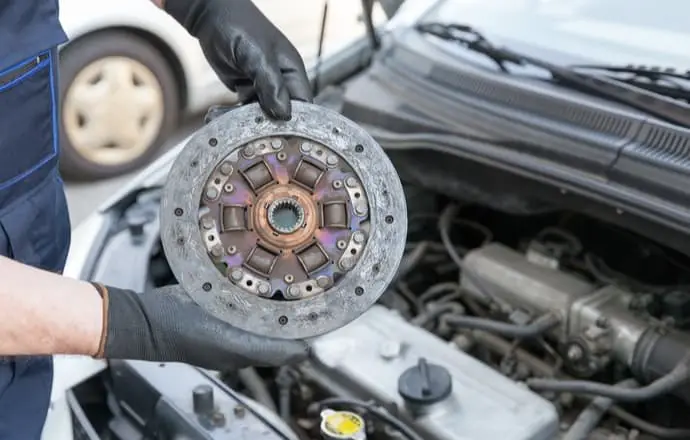Last Updated on August 19, 2022 by

The ability to shift between gears is one of the most basic yet essential functions of any vehicle. You need to make sure that you are going at the right speed, and in order to do that, you need to make sure you are in the right gear. In automatic transmission, your car handles this transition for you. High-end vehicles still tend to allow for greater control over your vehicle via manual transmission, however, which means you should have some familiarity with your clutch and how it works.
No one wants to have to deal with issues with their clutch and transmission system.
Thankfully, with this guide, you can identify and resolve issues with your clutch in a quick and easy manner, allowing you to get back out on the road more quickly.
Clutch 101
First things first – what is a clutch, exactly, and how does it work?
As mentioned, your clutch is responsible for helping you shift gears in a vehicle with manual transmission. It does this by transferring rotational power from the engine to your wheels in such a way as to achieve this change. In a vehicle with a manual transmission, it connects two or more shafts which rotate in such a way as to make sure your wheels are constantly spinning in sync with your engine.
Changing gears and speeds in a moving vehicle is a delicate process. You don’t want to bring your car to a halt in order to change speeds, but you also don’t want to change gears in a haphazard way that causes the connection between your wheels and engine to suffer. This is where the clutch comes in.
The clutch itself is made up of a clutch plate and a flywheel. The former is attached to a set of springs which keep it in place against the latter. All of this is in turn connected to your engine, which generates motion which the rotating shafts connected to and controlled by your clutch plate-flywheel combo then transfer to your wheels.
When you press your foot to a clutch pedal located near the bottom of your car’s interior, it activates a release fork which causes springs and pins to activate in such a way as to take pressure away from the clutch plate. This allows you to temporarily break the connection between your wheels and the rotating shafts connecting to your engine via the clutch, which allows you to safely shift gears.
Symptoms of a Clutch Issue
As indicated by that description, your clutch has many moving parts which are responsible for maintaining the delicate and crucial connection between your engine, those rotating shafts., and your wheels. As is so often the case in the world of engineering, the more parts there are, the more potential there is for something to go wrong
Your clutch is no exception. Some signs that you are experiencing clutch problems include the following:
Car Slowing
Remember, your clutch is responsible for gear shifts, which are in turn responsible for helping your car safely attain higher speeds. If your car is starting to slow, issues with your gears and manual transmission may be one reason why, and if this is the case, your clutch may be at fault.
Squealing Noises
Your clutch should operate silently. If you hear your clutch start to make squealing noises, chances are there is a problem.
Clutch Slippage
Does your car start out slowly but then slip into higher speeds without you wanting it to? If so, clutch slippage – where the gears slip and don’t control speeds and gear changes as effectively as they should – may be to blame.
Can’t Shift Gears
Not being able to change gears, or even get out of reverse, is a pretty telltale sign that there’s something wrong with your clutch.
Grinding Sounds
In addition to squealing, growling or grinding gear sounds can indicate that gears are grinding against one another, which in turn indicates a clutch problem.
Causes of and Solutions to Clutch Problems
There are likewise many potential causes of clutch problems, with some of the common being as follows:
Oil Contamination
As with many parts of your car, to make sure that your clutch and the rotating parts and gears to which they are attached work properly, you need to make sure that everything is kept oiled and in good condition. That said, a buildup of
Parts Grinding on Each Other
As mentioned, clutch gears can sometimes grind against one another. This can happen due to your clutch or the parts attached to it being knocked out of alignment. Separating them out again and making sure they are aligned properly is essential for curing this problem.
Parts Wearing Out
As parts get older, they start to wear out. If you have had the same clutch for years or more than 10,000 miles, it may be time for a new one.
Hydraulic Leak
Your hydraulic system is essential for making sure that your clutch and the rest of your transmission system remain in good working order. If you are leaking water, your transmission can start to suffer, which in turn can affect your gears. You will therefore need to determine the cause of the hydraulic leak and either patch and repair it or replace your hydraulic system altogether.
Flywheel
Your clutch is attached to the flywheel, and the condition of one can greatly impact that of the other. You do not want a flywheel which is cracked, dirty, or otherwise unable to rotate properly. If your flywheel is cracked, dirty, or otherwise damaged, you will need to repair or replace it while making sure that the new flywheel is compatible with your clutch.
By understanding how a clutch works and knowing what clutch issues to look out for and which signs can herald such problems, you can save your car from the “clutches” of clutch trouble.
